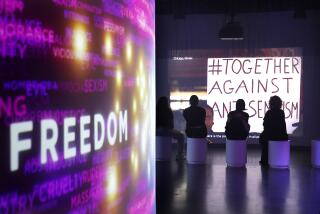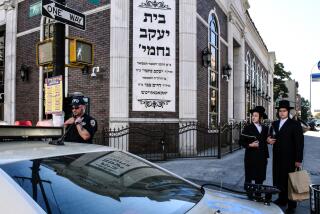Soviet Jews See Anti-Semitism on Rise at Home : Judaism: Former refuseniks attend. But Sharansky is denied a visa.
- Share via
MOSCOW — The first nationwide conference of Soviet Jews in nearly 70 years wound up a five-day meeting Friday with the warning that anti-Semitism is on the rise in the Soviet Union.
Outside the hall where the session was being held, about 200 Palestinians demonstrated, shouting “Zionists, out!”
On the conference’s opening day Monday, Russian nationalists also had shouted “Zionists, go home!”
The meeting, organized by more than 160 Jewish organizations in 75 cities, marked the first time since 1920 that Jewish leaders have been allowed to congregate openly to establish a national organization.
Former refuseniks now living abroad, deputies from the Soviet Parliament and about 150 Jewish leaders from the West were among the 650 people attending the conference. But Soviet officials denied a visa to Jewish activist Natan Sharansky, who spent nine years in Soviet labor camps before emigrating to Israel in 1986.
“The fact that people from all over the world have been able to gather here and speak openly about the plight of Soviet Jews is certainly a step forward,” said Irving Silver, from Mobile, Ala. “But we must be cautious. A near-pathological anti-Semitism still exists here.”
Organizers of the meeting, including Alexander Shmukler, president of the Moscow branch of B’nai B’rith, said anti-Semitism ironically has been fueled by glasnost, or President Mikhail S. Gorbachev’s policy of greater openness, which also has allowed Jewish organizations to enjoy greater freedom.
“Also, anti-Semitism also comes to the fore in a time of political instability,” Shmukler said. “Right this moment the food stores are empty, and people want to know who to blame. Tomorrow or the day after, they might decide to blame the Jews.”
On its first day, the conference had elected a council to represent Soviet Jewry in the West and study three main issues: the emigration of Jews, the renewal of Jewish culture in the Soviet Union and the state of anti-Semitism here.
Alexander Brodsky, a 50-year-old writer from Kishinev, Moldavia, said the delegates to the conference were unwilling to take necessary radical decisions.
“We can’t talk about Jewish renaissance in the Soviet Union,” he said. “We should be taking advantage of this small opening to emigrate, because who knows when the opening will close up again.”
“It is an exciting time, but a fearful time. Who knows how quickly things could change?” said Meridel Rawlings, a delegate from Jerusalem.
Soviet delegates to the conference said they plan to send a telegram to the Supreme Soviet, asking the Parliament to acknowledge officially that anti-Semitism exists in the Soviet Union and must be fought.
While the Kremlin may not take enough steps to fight anti-Semitism, it does seem to be preventing such sentiments from being expressed in the state-run media, according to American analysts and diplomats based in Moscow.
Emigration of Soviet Jews has reached record levels under Gorbachev. An all-time high of 55,465 Soviet Jews were registered at a transit center in Vienna during the first 10 months of 1989. More Jews left via Romania and Hungary.
In addition, a deputy foreign minister, Anatoly Adamishin, told American delegates to the conference that a “substantial” number of Jewish refuseniks, those who have repeatedly been denied permission to emigrate, will be allowed to leave the country soon.
As the conference opened, about 60 jeering members of the Russian nationalist Pamyat society jostled delegates when they tried to enter the hall.
The nationalists waved signs saying, “Zionists Out of the U.S.S.R.” and “Jews, Get Out of the Union.”
On Thursday, several dozen visiting Palestinian students, most wearing the traditional kaffiyeh headdresses, demonstrated outside the conference hall. About 200 Palestinian protesters returned for the conference’s final day Friday, many waving pictures of Palestine Liberation Organization chief Yasser Arafat and chanting anti-Zionist slogans. Some of them burned an Israeli flag. Dozens of police officers watched the protest but did not interfere.
More to Read
Sign up for Essential California
The most important California stories and recommendations in your inbox every morning.
You may occasionally receive promotional content from the Los Angeles Times.













